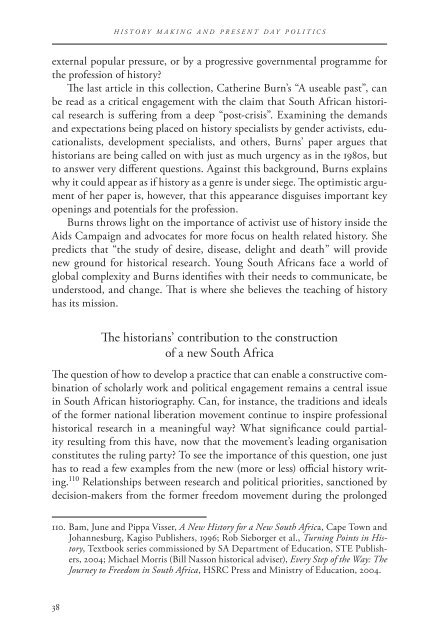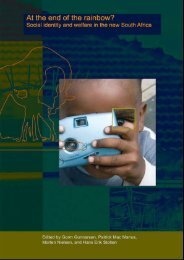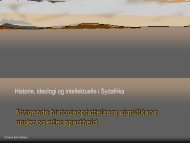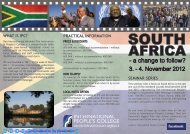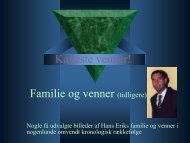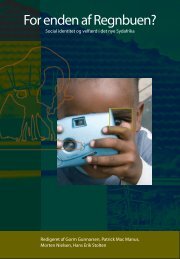History Making and Present Day Politics - Stolten's African Studies ...
History Making and Present Day Politics - Stolten's African Studies ...
History Making and Present Day Politics - Stolten's African Studies ...
Create successful ePaper yourself
Turn your PDF publications into a flip-book with our unique Google optimized e-Paper software.
h i s t o r y m a k i n g a n d p r e s e n t d a y p o l i t i c s<br />
external popular pressure, or by a progressive governmental programme for<br />
the profession of history?<br />
The last article in this collection, Catherine Burn’s “A useable past”, can<br />
be read as a critical engagement with the claim that South <strong>African</strong> historical<br />
research is suffering from a deep “post-crisis”. Examining the dem<strong>and</strong>s<br />
<strong>and</strong> expectations being placed on history specialists by gender activists, educationalists,<br />
development specialists, <strong>and</strong> others, Burns’ paper argues that<br />
historians are being called on with just as much urgency as in the 1980s, but<br />
to answer very different questions. Against this background, Burns explains<br />
why it could appear as if history as a genre is under siege. The optimistic argument<br />
of her paper is, however, that this appearance disguises important key<br />
openings <strong>and</strong> potentials for the profession.<br />
Burns throws light on the importance of activist use of history inside the<br />
Aids Campaign <strong>and</strong> advocates for more focus on health related history. She<br />
predicts that “the study of desire, disease, delight <strong>and</strong> death” will provide<br />
new ground for historical research. Young South <strong>African</strong>s face a world of<br />
global complexity <strong>and</strong> Burns identifies with their needs to communicate, be<br />
understood, <strong>and</strong> change. That is where she believes the teaching of history<br />
has its mission.<br />
The historians’ contribution to the construction<br />
of a new South Africa<br />
The question of how to develop a practice that can enable a constructive combination<br />
of scholarly work <strong>and</strong> political engagement remains a central issue<br />
in South <strong>African</strong> historiography. Can, for instance, the traditions <strong>and</strong> ideals<br />
of the former national liberation movement continue to inspire professional<br />
historical research in a meaningful way? What significance could partiality<br />
resulting from this have, now that the movement’s leading organisation<br />
constitutes the ruling party? To see the importance of this question, one just<br />
has to read a few examples from the new (more or less) official history writing.<br />
110 Relationships between research <strong>and</strong> political priorities, sanctioned by<br />
decision-makers from the former freedom movement during the prolonged<br />
110. Bam, June <strong>and</strong> Pippa Visser, A New <strong>History</strong> for a New South Africa, Cape Town <strong>and</strong><br />
Johannesburg, Kagiso Publishers, 1996; Rob Sieborger et al., Turning Points in <strong>History</strong>,<br />
Textbook series commissioned by SA Department of Education, STE Publishers,<br />
2004; Michael Morris (Bill Nasson historical adviser), Every Step of the Way: The<br />
Journey to Freedom in South Africa, HSRC Press <strong>and</strong> Ministry of Education, 2004.<br />
38


